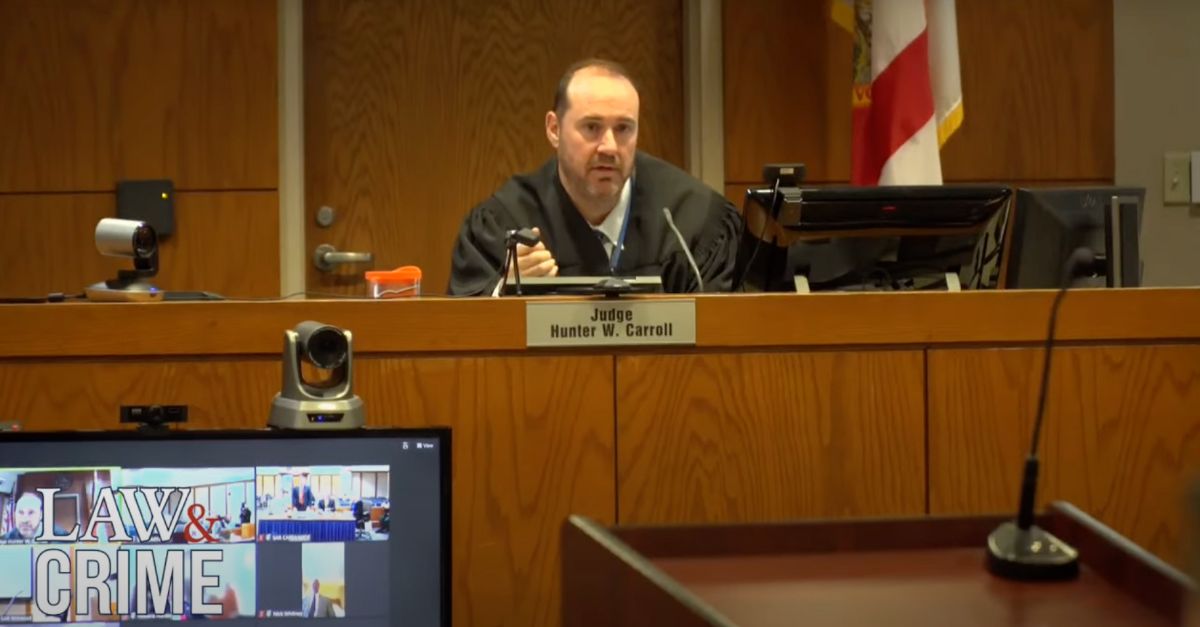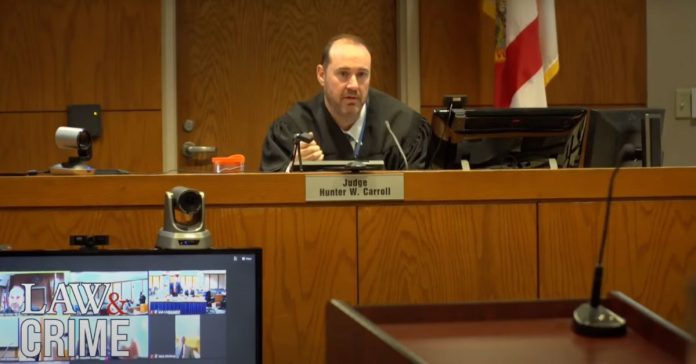
Judge Hunter W. Carroll rules on a motion for a new trial in the Maya Kowalski case on Jan. 3, 2024. (Law&Crime Network)
The Florida hospital that was recently found civilly liable for medically kidnapping a young girl to the point it drove her mother to suicide lost its first bid for a new trial on Wednesday afternoon.
The new trial motion was based on shocking allegations of juror misconduct allegedly committed by Juror Number 1.
Chief among those claims was the notion that the juror had an extreme dislike of one of the defense witnesses, a hospital employee named Sally Smith. In a headline-generating filing, Johns Hopkins All Children’s Hospital in St. Petersburg suggested that Juror No. 1 likened Smith to the Nazi Schutzstaffel, widely known by their initials, SS.
Before the hearing, the court severely cabined the line of questioning that the juror would be subject to — entirely short-circuiting the hospital’s efforts to bring up the Nazi-Smith imagery allegations.
Whither Child Services?
The questioning began with Judge Hunter W. Carroll showing the juror a court filing submitted by his then-wife in 2002. Both agreed the case was more or less over before it began. The juror was served, and his then-wife never showed up for a scheduled hearing.
That 20-plus-year filing had something to do with minors — because the couple had three children at the time, judge and juror established. Carroll then asked Juror No. 1 some pointed questions.
First, the judge wanted to know if the Florida Department of Children and Families (DCF) had any involvement with the three minor children.
The juror said he did not.
Then, the judge asked if the DCF ever sheltered his children.
Again, the answer from the juror was a “No.”
In their first supplemental motion for a new trial, hospital attorneys argued Juror No. 1 “may have harbored ill feelings” toward DCF.
So, the judge asked the juror if, at the time the Kowalskis filed their lawsuit, he had any “strongly held opinions” about the DCF.
The juror said he did not. The judge got slightly more specific.
“How about the government’s ability to remove children from the care of their parents?” Carroll asked.
To which the juror replied: “No opinion at all.”
Debra Salisbury, J.D.
An even shorter series of inquiries concerned a Sarasota-based attorney named Debra Salisbury, who represented the Kowalski family while Maya was still being kept away from her family.
The hospital claims that Salisbury represented or was otherwise involved with the juror’s current wife during a 2007 case.
That case did not include the juror — he married his wife in 2016.
In response to Carroll’s questions, the juror said he did not know Salisbury, had never heard about her until All Children’s made their allegations in the new trial motions, and that he has, to his knowledge, never been around Salisbury in any kind of official proceeding.
The Court’s Instructions
Questioning then turned to wider and more specific issues about the instructions Carroll gave jurors when the proceedings began.
In response to a question, Juror No. 1 said he followed all the court’s instructions. Pressed by the judge, the juror said he did not speak with anyone, including his wife, about the case while it was in progress.
Earlier efforts by the hospital to win a new trial included allegations that Juror No. 1 shared information about the case with his wife, who then shared the information in online, pro-plaintiff communities.
“Are you able to tell me for sure that your wife — or no one else — no one gave you any information about this case at all?” Carroll asked.
“No one,” the juror replied. “And I did not seek out any information.”
Other questions about outside information — either coming or going — resulted in the juror saying that he did not obtain any information about the case while it was going on in any other way. Specifically, when asked, he said he never saw the website of one of Maya’s primary care physicians — stressing that he neither searched for it himself nor saw it when someone else searched for it.
Juror No. 1 Leaves
With the juror outside the courtroom, the hospital asked for a few additional questions to be leveled against Juror No. 1.
An attorney for the hospital explained that the juror’s wife came into court one day during the trial and watched the proceedings.
The hospital wanted the judge to inquire as to whether (1) the juror had any discussions with her about her attendance beforehand, (2) whether the juror saw his wife in court that day, (3) whether the juror and his wife communicated in any way during the trial that day; (4) whether they had lunch together that day; and (5) whether or not the couple talked about the day’s proceedings after the fact.
An attorney for the Kowalski family objected to all of the questions offered by All Children’s — noting that the court did not order anyone to be mute with their wife or not to look at their wife.
“We believe that these questions are completely inappropriate and lead us nowhere,” the plaintiff’s attorney said.
The judge did pare the questions down a bit.
Juror No. 1 Returns
Upon returning to the stand, the juror and judge established that the man’s wife appeared in court the day before he dyed his hair orange for Halloween — a significant point only for memory’s sake.
Asked whether he saw his wife in court that day, the juror said he did not — because he suffers from various issues with his vision.
Then, Carroll asked Juror No. 1 if he knew his wife was coming to court that day. He said he did know that she was coming. The juror said his wife expressed interest in attending that same morning — and that he acknowledged her request: “I said ‘fine with me’ and that was the end of the conversation.”
The juror said there was no communication between himself and his wife — visual or non-visual — in court that day.
The juror was then released.
Closing arguments
Closing arguments were exceptionally quick.
An attorney for the hospital said the defense’s argument comes down to credibility. He said their side wanted to ask additional questions but understood the court foreclosed against them.
The Kowalski family’s attorney was also succinct.
“The court essentially wrote our argument,” the plaintiff’s attorney said. “It’s time to put this to bed.”
The judge then tersely ruled in favor of the Kowalskis.
“At the end of the day, the defense has failed to demonstrate any juror misconduct,” Carroll ruled. “The court will therefore deny the motion for new trial based on juror misconduct.”
The ordeal suffered by then-10-year-old Maya Kowalski and her family is famously depicted in the popular and critically acclaimed Netflix documentary, “Take Care of Maya.” A roughly two-month-long civil trial earlier this year reprised the claims made in that film against the hospital for the way staff there treated the chronically ill girl — and then some — including her false imprisonment and battery.
In November, a six-person jury in Sarasota County unanimously found Johns Hopkins All Children’s Hospital in St. Petersburg liable for the incidents leading up to the January 2017 death of Beata Kowalski, 43. Jurors awarded the Kowalski family far more than they even requested — a total of $261 million in compensatory and punitive damages to make up for their loss and to punish the hospital.
With the juror issue now off the table, other new trial motions are left to be dealt with. Caroll said he hopes to have more answers to various outstanding motions by Jan. 22.
Have a tip we should know? [email protected]

